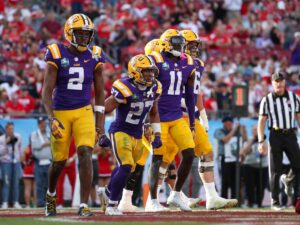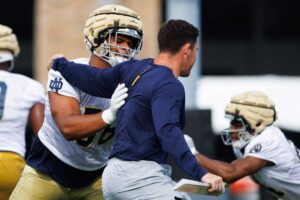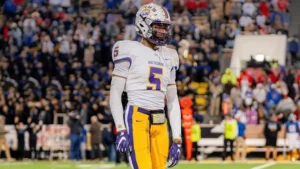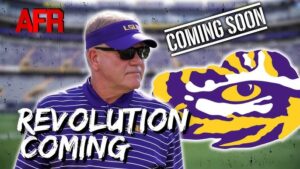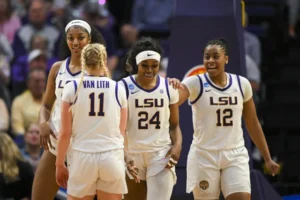
Alabama WR Ryan Williams Signs $1 Million NIL Deal with EA Sports, Pledges 10% to College Football Development
In a groundbreaking move for both college athletics and the world of gaming, Alabama Crimson Tide wide receiver Ryan Williams has made headlines by signing a $1 million Name, Image, and Likeness (NIL) deal with EA Sports, one of the leading video game companies in the world. The deal, which marks a significant milestone in the ongoing evolution of college sports sponsorships, not only cements Williams’ place among the top emerging athletes but also reflects the growing power and influence that student-athletes now have in shaping their own financial futures.
Adding a remarkable layer to the announcement, Williams has pledged to donate 10% of the earnings from the deal to support college football development initiatives. His philanthropic gesture highlights his recognition of the broader impact and responsibility athletes hold in the sports industry. As NIL rights continue to reshape the college sports landscape, Ryan Williams’ decision to give back exemplifies how student-athletes are leveraging their newfound financial opportunities for social good.
Ryan Williams: The Rising Star at Alabama
Before diving into the details of his NIL deal and its far-reaching implications, it’s important to understand who Ryan Williams is and why his deal with EA Sports is such a significant development in college athletics.
Ryan Williams, a sophomore wide receiver at the University of Alabama, has quickly emerged as one of the top talents in college football. Standing at 6’2″ and weighing 205 pounds, Williams boasts an athleticism and versatility that has caught the attention of both fans and scouts alike. His ability to make explosive plays in the open field, combined with his sharp route-running and reliable hands, has made him a standout for the Crimson Tide.
Having played a key role in Alabama’s offensive scheme, Williams’ performances have not gone unnoticed. His highlight-reel catches, remarkable speed, and on-field composure have solidified his reputation as one of the best young wide receivers in the country. As a result, Williams has drawn considerable interest from brands, teams, and sponsors who are eager to capitalize on his growing fame and potential.
But what truly sets Williams apart is not just his athletic ability—it’s his mindset and the way he uses his platform. From the beginning of his college career, Williams has shown a remarkable level of maturity in handling the pressures and challenges that come with being a top-tier athlete. His academic dedication, commitment to community service, and focus on his long-term career goals have set him on a trajectory toward success both on and off the field.
The NIL era, which officially began in July 2021, has opened new doors for college athletes like Williams to monetize their talent, brand, and image in ways that were previously prohibited. For Williams, this has been a game-changer, allowing him to take control of his financial future while still focusing on his goals of excelling in college football.
The Power of NIL: A New Era in College Athletics
The concept of NIL has become one of the most discussed topics in college sports since the NCAA adopted new rules allowing athletes to profit from their name, image, and likeness. Before the change, college athletes were prohibited from receiving financial compensation from outside sources. However, with the explosion of social media, increasing television deals, and the growing popularity of college athletics, the pressure to allow student-athletes to benefit from their public personas became too great to ignore.
The NIL rules have sparked a revolution in the world of college sports. Athletes from all sports—football, basketball, soccer, and beyond—now have the opportunity to sign endorsement deals, promote products, and use their name and likeness to generate income. These new opportunities have empowered athletes to build their personal brands, create digital content, and form partnerships with companies eager to align themselves with popular young stars.
For athletes like Williams, NIL represents both a financial windfall and a way to take control of their careers in an industry that has long profited from their hard work without compensating them directly. Williams’ $1 million deal with EA Sports is one of the most lucrative NIL agreements signed by a college football player to date and is indicative of the high-value contracts emerging as the market for college athlete endorsements continues to grow.
The partnership with EA Sports also underscores the growing crossover between sports and entertainment. EA Sports is well-known for producing popular video games such as “FIFA,” “Madden NFL,” and the college football series “NCAA Football.” These games allow fans to engage with their favorite athletes and teams in a virtual world, further fueling the fan experience and helping athletes build their brands outside of the traditional sports media landscape.
EA Sports and College Football: A Natural Partnership
EA Sports has long been a dominant player in the world of sports gaming. For years, the company’s “NCAA Football” video game series provided fans with the chance to simulate college football games using real-life teams and players. However, following the NCAA’s ban on athlete compensation, EA Sports was forced to discontinue the series in 2013, as it could no longer use real players’ names and likenesses without running afoul of NCAA rules.
With the advent of NIL rights, EA Sports has once again reentered the world of college football gaming. The company’s decision to enter into deals with current athletes like Ryan Williams is a clear indicator of how much the gaming industry stands to gain from the changing landscape of college athletics. By partnering with top college athletes, EA Sports can not only enhance the realism and appeal of their games but also tap into the personal brands of these athletes, creating new avenues for marketing and promotion.
For Williams, this partnership is a golden opportunity to capitalize on his rising star status. EA Sports’ games have a massive following, and Williams’ inclusion in the upcoming “NCAA Football” game will undoubtedly elevate his profile even further. As a key figure in Alabama’s high-powered offense, Williams’ digital representation in the game will make him one of the most recognizable figures in college football for fans and gamers alike.
Giving Back: Williams’ 10% Pledge to College Football Development
While the financial aspect of Williams’ NIL deal with EA Sports is undoubtedly significant, it’s his decision to donate 10% of his earnings to college football development initiatives that has garnered widespread admiration.
Williams’ pledge reflects a deep sense of responsibility and awareness of the privilege he has in being able to profit from his athletic abilities. In his statement, Williams emphasized that the growth of college football has been made possible by the countless people and institutions that support the sport—coaches, staff, administrators, and of course, the fans. By donating a portion of his NIL earnings to college football development, Williams is giving back to the sport that has given him so much.
The funds donated by Williams will be directed to various initiatives aimed at enhancing the college football experience for players, coaches, and fans. This could include scholarships for underprivileged student-athletes, funding for training programs, support for player safety and health initiatives, or contributions to grassroots football programs aimed at growing the game at the high school and youth levels.
In a sport as commercially driven as college football, where major universities and media networks rake in billions of dollars, it’s easy for the needs of the athletes themselves to get lost in the shuffle. Williams’ philanthropic efforts highlight the importance of maintaining a sense of community and social responsibility within the industry. His decision to reinvest a portion of his NIL earnings into the future of the sport shows that even as individual athletes capitalize on their newfound opportunities, they can still make a positive impact on the larger ecosystem that sustains college football.
Moreover, Williams’ generosity serves as an example for other athletes in the NIL era. As more student-athletes secure lucrative endorsement deals, there’s growing potential for a shift in the culture of college athletics—one that prioritizes not just personal financial gain but also community impact and long-term sustainability.
The Future of NIL and College Sports
As NIL deals continue to reshape the college sports landscape, the influence of athletes like Ryan Williams will only grow. His deal with EA Sports and his commitment to giving back to college football development initiatives represent the intersection of athletic achievement, financial opportunity, and social responsibility.
Looking ahead, it’s clear that NIL has the potential to change the way college athletes approach their careers. The ability to profit from their name, image, and likeness provides financial security, but it also comes with a platform that can be used to drive social change. Ryan Williams’ philanthropic pledge is just one example of how athletes can use their influence for good, ensuring that the benefits of NIL extend beyond the personal gains of the athletes themselves and reach the broader community.
As for Williams, the future looks incredibly bright. His on-field performances have already established him as one of the most promising young receivers in college football, and his savvy off-field decisions—including this lucrative NIL partnership with EA Sports—have set the stage for a long and successful career. Whether on the field or through his charitable endeavors, Ryan Williams is proving that the next generation of college athletes is more than just talented competitors; they are also responsible leaders who understand the value of giving back to the sport and community that helped them get to where they are.
